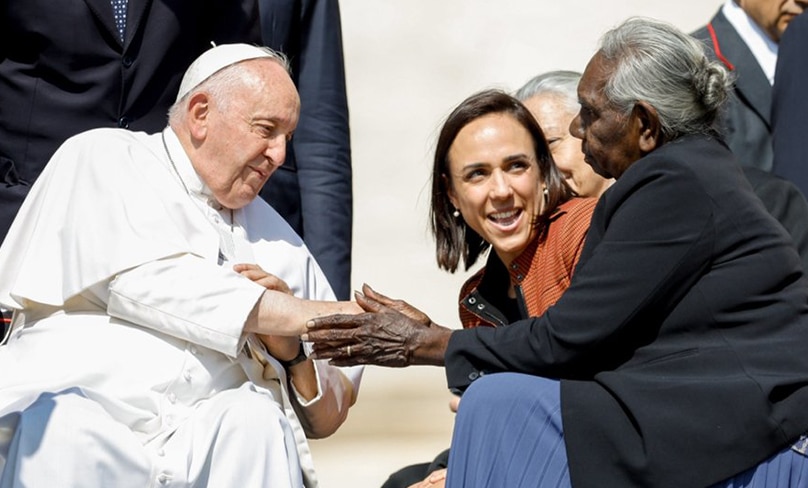
By Craig Arthur
Following the Voice to Parliament referendum, we find ourselves in a moment of solemn reflection. We contemplate the deep historical significance of the path our nation has chosen, a path too familiar to the Aboriginal and Torres Strait Islander Peoples.
Time and again, they have invited us to partake in the wisdom of the world’s oldest continuing culture, seeking agency in decisions that shape their lives. Yet, time and again, their voices have been set aside.
While the Voice proposal was in no way perfect, it posed a vital question: Do we let the quest for perfection overshadow the pursuit of what’s good and right? As Fr Frank Brennan, a dear friend to both myself and NATSICC, so eloquently put it, “Do we choose some wording which may not be perfect, or do we say No and we put this off to another day?” It seems Australia chose the latter.
The grace, resilience, and fortitude displayed by many of our First Peoples in the face of this referendum’s outcome were truly moving. The statement released by the NATSICC Council on that solemn Sunday morning encapsulates their spirit:
“When we started this journey, we knew it would not be easy. We knew that there were many hurdles to overcome. This has been the case for Aboriginal and Torres Strait Islander Peoples for over 200 years.
“Our strong culture and spirituality have helped us to survive through challenges, and an unsuccessful outcome to the Voice to Parliament referendum is just another challenge that we will face with dignity, respect and without losing hope.”
Having been blessed to work closely with Aboriginal and Torres Strait Islander communities for a quarter of a century, I am continually humbled by their remarkable resilience and grace.
Throughout this period, I have been witness to their enduring spirit, even when their very essence was up for public scrutiny. Their ancient presence in this land offers us invaluable lessons, and it’s time we accept their generous invitation to walk alongside them.
A conversation with a young emerging Aboriginal Catholic leader left an indelible mark on me. Sharing her despair over the referendum’s outcome, she recounted her mother’s words of solace, “It’s a pattern we’ve come to know. But we keep pushing forward, hoping someday they’ll listen.”
This sentiment, while heart-wrenching, also carried a spark of undying hope, as the response was, “We can’t simply continue to accept rejection.”
As we grapple with the aftermath, our foremost task is to mend the wounds of our nation. Healing is not just the alleviation of symptoms; it is a restoration of wholeness, a reintegration of body, mind, and spirit in the love of God.
Friendships, families, and communities have become divided and suffered in a climate of confusion and misinformation. We can combat misinformation with truth, fear with faith and resentment with understanding and forgiveness. This all starts in our own hearts.
Both our Catholic traditions and the practices of the Aboriginal and Torres Strait Islander Peoples recognise healing as a communal undertaking. While we unite in prayer and celebration, First Australians have gathered for healing rituals and “Sorry business” for tens of thousands of years.
Now, more than ever, we need to intertwine these traditions, championing unity and reconciliation.
The Catholic Church in Australia, with NATSICC as its “Voice” for over three decades, is deeply rooted in teachings that uphold individual dignity, decentralised decision-making, and prioritising those most in need.
We now are challenged to use the resources at our disposal and apply these teachings in tangible actions.
The success of the “One Journey, Together” initiative, which I had the honor of being a part of, fills me with hope. Designed to equip Catholics for the referendum, it facilitated the formation of a coalition of over 30 peak Catholic bodies, orders and groups.
Each of these groups committed to walking alongside Aboriginal and Torres Strait Islander Catholics on the Journey to reconciliation. For them, the journey is just unfolding.
Drawing inspiration from St John Paul II’s message to the Aboriginal and Torres Strait Islander Peoples in 1986, I conclude with these words: Australia will not be the country that Jesus wants her to be until Aboriginal and Torres Strait Islander Peoples can make their contributions to Australian society, and until that contribution has been joyfully received.
Craig Arthur serves as the National Administrator of the National Aboriginal and Torres Strait Islander Catholic Council (NATSICC) in Adelaide. With a tenure spanning 23 years, he holds a degree in Aboriginal Affairs Administration from the University of South Australia. Prior to his current role, he coordinated efforts at the Otherway Centre/Aboriginal Catholic Ministry in Adelaide. A fervent advocate for social justice, Craig has devoted his career to championing and assisting underserved communities.
